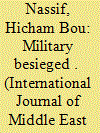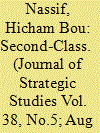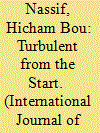| Srl | Item |
| 1 |
ID:
143812


|
|
|
| 2 |
ID:
139901


|
|
|
|
|
| Summary/Abstract |
This article draws on extensive fieldwork and original data to trace the transformation of civil–military relations in Tunisia during the tenure of the former president Zayn al-ʿAbidin bin ʿAli (1987–2011). The republican ethos of the Tunisian Armed Forces (al-Quwwat al-Musallaha al-Tunusiyya) is often stressed to explain its traditional political quiescence. However, I maintain that it was the active hostility of the military's rivals within the Bin ʿAli regime that prevented Tunisian generals from playing a greater role in their country's public life. I disaggregate Bin ʿAli's regime into its fundamental institutional components—namely, the presidency, the party, the police, and the military—and investigate rivalries and alliances that structured the struggle for influence and power between Bin ʿAli's rise to the presidency and his downfall. I argue that there is a direct and causal relationship between the 2010–11 uprising and inter- and intrainstitutional dynamics within the regime. In other words, the study of contemporary Tunisian civil–military relations is critical to understanding the breakdown of the Bin ʿAli regime.
|
|
|
|
|
|
|
|
|
|
|
|
|
|
|
|
| 3 |
ID:
142644


|
|
|
|
|
| Summary/Abstract |
The defection of a significant number of Sunni officers amidst the ongoing turmoil in Syria created a unique opportunity to get access to original data on the Syrian armed forces. This study draws on extensive fieldwork to probe the sectarian question in the Syrian officer corps. On the basis of a series of interviews conducted throughout the summer of 2014, I investigate the politics and consequences of sectarian stacking in the Syrian military as well as the root causes of Sunni officers’ grievances and alienation. My conclusions draw on an original database that compiles the sectarian affiliations of 81 prominent officers who occupied the most senior military positions under Bashar al-Asad.
|
|
|
|
|
|
|
|
|
|
|
|
|
|
|
|
| 4 |
ID:
174495


|
|
|
|
|
| Summary/Abstract |
This article reconsiders military politics in Syria prior to the 1963 Baʿthi power grab in light of new sources. I undermine the presumptions that Baʿthi tactics of sectarian favoritism in the armed forces were unprecedented in post-independence Syria. I make the following arguments: first, attempts by the Sunni power elite to tame Syrian minorities were part of a broad sequence of events that spanned several regimes and informed politics in the Syrian officer corps; second, the various military strongmen who ruled Damascus intermittently from 1949 until 1963 distrusted minority officers and relied mainly on fellow Sunnis to exert control in the armed forces; and third, the combination of minority marginalization in Syrian politics and Sunni preferentialism inside the armed forces bred enmity and polarized sectarian relations in the officer corps.
|
|
|
|
|
|
|
|
|
|
|
|
|
|
|
|
| 5 |
ID:
124747


|
|
|
|
|
| Publication |
2013.
|
| Summary/Abstract |
This article discusses postretirement appointments and financial rewards the Egyptian military elite secured under former Egyptian president Husni Mubarak. It draws on two original databases: the first analyzes the professional background of the 156 Egyptian governors appointed by Mubarak, and studies the evolution of the military elite's share of governorship positions throughout his years in power. The second database includes details on postretirement careers of Egypt's top 65 officers who led the main corps of the armed forces under Mubarak. It analyzes mechanisms used by Mubarak's predecessors to secure the loyalty of the military elite, and shows that increasing the privileges of the top brass remained a stable feature of control systems that were otherwise fundamentally different. It discusses how Mubarak wedded senior officers to his regime throughout his three decades in power by enhancing their material privileges and allowing them to profit from their postretirement positions, unhindered by monitoring agencies.
|
|
|
|
|
|
|
|
|
|
|
|
|
|
|
|